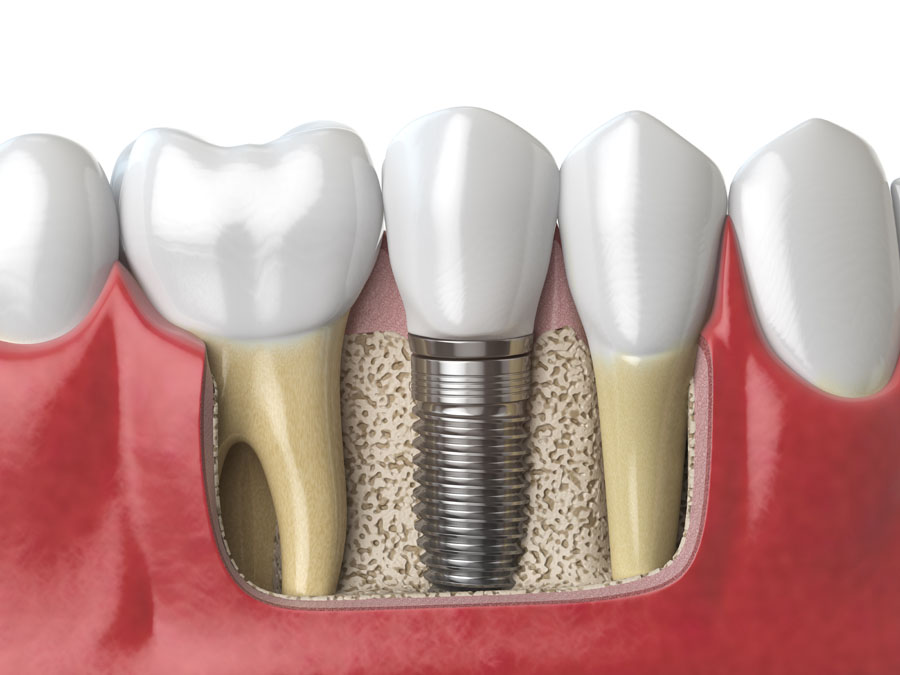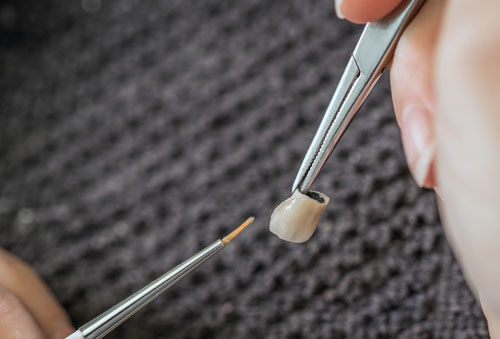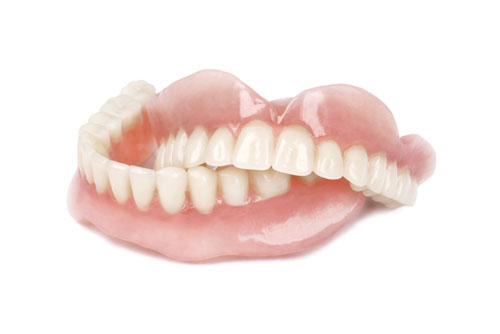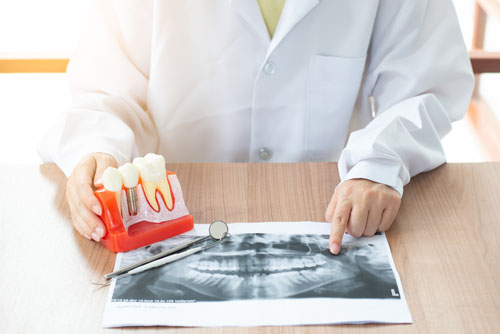Dental Implants
Advances in dental care mean that more people are expected to retain their natural teeth for longer. There are, however, many who are currently missing teeth in their upper and lower jaws. Whether you have lost one or more teeth as the result of decay or injury, gaps between your otherwise healthy teeth can lead to several oral health concerns.
The primary concern that patients face will relate to aesthetics. Missing teeth can result in lowered self-esteem and confidence. Patients often find that they start to avoid laughing or smiling. Other concerns are potential damage to the teeth nearby, as they are more exposed to harm, teeth moving, problems talking and pronouncing words properly and the alignment of the jaw and proper function.
Dental implants are a permanent solution that offers a wholly natural look once they are in place.


What are dental implants?
Dental implants are made with surgical-grade titanium. They are a permanent artificial root for the lost natural root. The titanium post is implanted surgically into the jaw bone during a visit to the clinic.
Once in place, it begins to fuse with the living tissue inside of the jaw bone. Once the healing process has been completed, the implant will function as the sturdy foundation for the new prosthetic tooth or crown.
Dental implants offer a wholly natural look for a patient with missing teeth. Titanium is bio-compatible and will not erode. It’s a reliable option for restoring lost teeth.
Perhaps the most important benefit to the replacement of one or more missing teeth is the confidence restoration that can come from having a beautiful smile that you are proud of.
Another consideration is something that many patients simply aren’t aware of. The teeth in our mouth help to support and preserve the jaw bone. When the teeth are missing, there is often a serious amount of bone loss in that area. This can, in turn, lead to the shifting of otherwise healthy teeth, along with the potential for facial sagging and the signs of premature ageing.
Implants can restore functionality, improve aesthetics and also ensure healthy jawbones.
Most patients who have lost one or more teeth will prove to be good candidates for getting dental implants. There is one major disqualifier for a tooth implant. The bone regression that can occur when the tooth has been missing for some time can mean that there isn’t sufficient healthy tissue for the implant to fuse with.
A bone graft can help increase the jaw bone level. Discussing your smile restoration goals and your available options with your periodontist or prosthodontist can help you to understand the process better.
There are several alternatives to implants for patients who are unsure whether the implants are the right choice for them. A bridge is one option if there are just one, two or three teeth missing in a row. Bridges are affixed to the healthy teeth that are on each side of the gap. They can restore the aesthetics and functionality to that part of the mouth. The negative point is that bridges degrade the nearby teeth, as they need to be filed down.
Patients who have more teeth missing may benefit from partial or full dentures or even dentures held in by implants
For some patients, the cost of implants can dictate the type of restorative dentistry that they have access to, but dental implants is the most complete solution for missing teeth, albeit the most expensive one.
The first step will be a thorough examination of the gum that will be receiving the implant. Your dentist may order X-rays to best determine the correct placement for the titanium post.
The gum will be numbed so that there is no pain or discomfort felt during the surgical implantation of the titanium post. Once completely numb, the periodontist will surgically implant the artificial root into the jawbone. A temporary restoration will be placed over the implant to ensure aesthetics are maintained.
Once the titanium implant has fused to the healthy tissue in the jaw bone, it’ll be time for the placement of the crown. Once the crown has been milled, it will be permanently attached in place.

What do dental implants cost?
If you are interested in learning more about dental implants, you’ve come to the right place at Cork City Dentist. We provide our patients with a wide range of competitively priced treatments. Review our pricing schedule below to find out more, and then book your consultation online. You can also call our clinic to speak to a dental professional.
We also provide Dental implant repairs, repairing the crown or abutment if necessary.
| Treatment | Price |
|---|---|
| Tooth whitening | €300 |
| Crowns (dependant on type) | from €700 |
| Porcelain veneers | from €700 |
| Dental Bridges | €700 per unit |
| Inlays & Onlays | from €500 |
| Dentures - Partial acrylic (plastic) | €550 - €650 |
| Dentures - Partial cobalt (metal base) | €1400 |
| Dentures - Full upper | €550 |
| Dentures - Full upper and lower | €1200 |
| Dental Implants - Crown | €1200 (+specialist fee for surgical treatment) |
Dental implants can restore your smile. Whether your smile is missing one or more teeth, you’ll find that a tooth implant is a comfortable and natural-looking solution. Book your appointment online or call our clinic at 0214501306
Other Treatments
Contact Us
Other Treatments you may consider

Dental Veneers
Preventing small dental issues from flaring up into much more severe health problems is possible when you maintain a good check-up routine with our dentist. Both a check-up and consultation for additional dental services and treatments can help you to ensure proper oral health.

Dental Crowns
A dental crown is a prosthetic/artificial piece that fits over a natural tooth after it has been restored or repaired. Some people refer to crowns as caps because they fit your tooth like a cap fits your head. Therefore the remaining natural tooth is enclosed and protected from fracture. Crowns can strengthen the natural tooth while also giving you an aesthetic restoration, which can restore a smile.

Composite Bonding
Bonding consists in the application of composite resin on dental surfaces to repair decayed, chipped or misaligned teeth. Composite resin has the advantage of being aesthetic, reasonably priced and very mouldable.. It is shaped and polished according to the characteristics of the surrounding teeth.

Dentures & False Teeth
Tooth loss can lead to several concerns, including a marked impact on the ability to speak clearly, along with issues of self-esteem and confidence. The loss of one or more teeth can result in bone-regression in the jaw bone and over-closing which can, in turn, lead to the signs of premature ageing.

Dental Bridges
Simply put, a dental bridge will bridge the gap that was created by the missing tooth or teeth. The bridge will be fixed to the healthy teeth on either side of the gap. These teeth may need to be capped with a crown to reinforce them or can just have a ‘wing’ of bridge material on the palate or tongue facing side.

Dental Implants
Advances in dental care mean that more people are expected to retain their natural teeth for longer. There are, however, many who are currently missing teeth in their upper and lower jaws. Whether you have lost one or more teeth as the result of decay or injury, gaps between your otherwise healthy teeth can lead to several oral health concerns.
Frequently Asked Questions
Dental implants are a titanium screw that is placed where the root of a tooth used to be and a false tooth or teeth is then attached to this screw. Implants are therefore used to replace missing teeth. They can be used to replace single teeth or even all of the teeth. The dental implant fixture is usually placed by an oral surgeon and the crown then placed on top by the dentist. The crown or false tooth may be screwed onto the dental fixture or glued on and is usually porcelain or porcelain with the precious metal underneath. Dental implants (the screw underneath) are made from titanium which has been used internally in the body for decades and proven to be safe. Titanium has the curious property of being ‘osteogenic’. That means that it loves bone and the feeling is mutual so they tolerate each other perfectly. Having a dental implant placed is a surgical procedure and should be considered as such. Some pain and swelling after the procedure are normal and your surgeon will provide you with pain relief medication afterwards. It may be likened to the feeling after a tooth is extracted and shouldn’t go far beyond that depending on how many implants are placed. Your surgeon will assess your particular situation. During the placement procedure, adequate anaesthetic should ensure you feel nothing.
As mentioned previously implants may be used for one tooth or a whole arch of teeth depending on what teeth are missing and are priced accordingly. A single tooth implant could be expected to cost from start to finish in the region of 2500 euro however this would tend to be discounted heavily if multiple teeth were to be replaced. As far as we are aware most dental insurances do not cover dental implants however rarely they do and it is worth contacting your provider. In our opinion properly placed AND maintained implants are by far the best way to replace missing teeth and represent the closest to natural teeth possible. There is no doubt implants are expensive but over decades of service would be well worth it. Dental implants well looked after can be expected to last for decades. They react extraordinarily like natural teeth and if you don’t look after them they will be lost just like natural teeth. They must be cleaned really well or they will get gum disease. They will also be sensitive to drastic changes in your general health such as cancer therapy or untreated diabetes. Having said all that a well looked after dental implant will last.
Dental implants should be treated like natural teeth. They should be cleaned with a soft or an electric toothbrush along with your other teeth. Dental floss or other interdental cleaners should be used. Above all food and plaque should not be allowed to sit around the gum collar as this can lead to a gum disease condition called peri-implantitis. Our dental hygienist will assess your home care every six months with shorter time intervals for people in higher-risk categories- for example, smokers or people who have chronic illnesses like diabetes. Often a special titanium tipped cleaner is used for cleaning dental implants as it was felt regular ultrasonics could damage the implant fixture. This is hotly debated and is being disputed at present.
When dental implants fail it is usually because of gum disease often mixed with a heavy bite. This leads to the implant fixture gradually detaching from the bone. Good home care is essential with regular trips to the hygienist. Smoking should be avoided as it is very hard on gums. In the presence of a grinding or clenching habit, a nightguard should be worn.
Missing teeth are unsightly and increase the biting load on the remaining teeth. Multiple missing teeth can reduce the face height by causing wear on the overloaded remaining teeth and allow the tongue to grow laterally. Dental implants are the best way to replace a missing tooth in our opinion. They are fixed and are not removable like a denture. They are stand-alone- that is they do not require work to be done on the adjacent natural teeth.
Also, they will last and last if treated well. They stop the bone in the area of a lost tooth from fading away thus maintaining face height avoiding the sunken cheeked look. Dental implants can also be used to stabilize a denture. So even if complete replacement of an arch is not possible due to poor bone or cost implications a smaller amount of implants can be placed and a denture constructed that will click onto the implants. This is extremely stable and will not move in the mouth yet is still removable.
Meet The Team
We have a Fantastic group of highly trained, friendly dental staff to ensure you get the best treatment in Cork.
Get in Touch with us Today
Please call or email us via the contact form and we respond to you as soon as possible.
Contact Info
Phone: (021) 450 1306 / (021) 450 1250
Email: [email protected]





